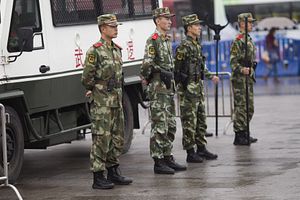China has its first anti-terrorism law on the books, after the National People’s Congress Standing Committee approved the new legislation on Sunday. The law, which will take effect in January, provides a legal framework for the country’s war on terrorism, a focus of increasing concern for Beijing after attacks at home and abroad jeopardized the lives of its citizens.
Abroad, most of the debate about the law focused on its technological provisions. A draft version sparked vocal pushback from the United States, with government officials and businesses alike worried about provisions that could require foreign tech firms to handover proprietary data to Beijing. China defended the law as necessary and in line with international precedents.
Notably, the final version of the legislation did not contain some of the most controversial provisions, including requirements for companies to store user data on serves within China and to allow the Chinese government to review their encryption systems. Instead, companies are required to provide “technical means of support” for anti-terror investigations, including decrypting data. They are also told to prevent the spread of materials supporting terrorism or extremism.
Foreign Ministry spokesperson Lu Kang was asked about the changes from the draft to the legislation in a press conference on Monday. He said that the anti-terror law as passed “is the answer to the latest situation and our objective needs” and stressed that it is no different from “relevant legislation [passed] by western countries.”
Li Shouwei, from the NPC Standing Committee’s legislative affairs commission, told the press that the new law “will not affect companies’ normal business nor install backdoors to infringe intellectual property rights.”
But while the provisions dealing with tech firms have attracted the most attention – thanks to media coverage overseas – other aspects have the potential to be much farther reaching, both for China’s war on terror and its security policy in general. For example, this law means that, for the first time, China has a legal definition of terrorism (a point Zunyou Zhou explored in more detail for The Diplomat previously). According to Xinhua:
The term “terrorism” is defined as any proposition or activity — that, by means of violence, sabotage or threat, generates social panic, undermines public security, infringes on personal and property rights, and menaces government organs and international organizations — with the aim to realize certain political and ideological purposes.
That’s the definition China’s government will now use to investigate terrorist threats and plots, using a new counterterrorism leading group and national intelligence center designed to streamline anti-terror work spanning multiple existing departments. The new law also restricts the coverage of terrorist attacks and government anti-terror efforts in the media (although reports were already tightly restricted before the law passed — one French journalist had her visa renewal blocked for criticizing China’s treatment of Uyghurs as part of its anti-terrorism crackdown).
The law also expands the scope for China to seek international cooperation in its anti-terror efforts. The new intelligence center, in addition to coordinating between Chinese government bodies, will also coordinate “trans-regional efforts on counter-terrorism intelligence and information,” according to Xinhua.
Further, the law allows China’s armed forces to take part in counterterrorism operations abroad, provided approval is granted by the foreign country in question. For now, that’s largely a moot point – China has shown neither the inclination nor the ability to conduct anti-terror military operations overseas – but it could well lay the groundwork for future military initiatives as China continues to expand its capabilities.































